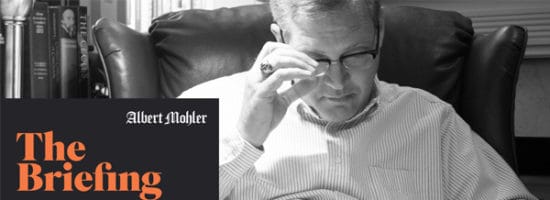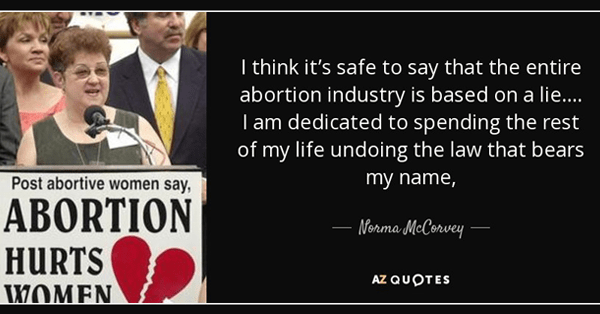Podcast: Play in new window | Download
Subscribe: RSS

I’m Albert Mohler and this is The Briefing, a daily analysis of news and events from a Christian worldview.
FROM PRO-CHOICE SYMBOL TO PRO-LIFE ACTIVIST: NORMA MCCORVEY, ‘ROE’ OF ROE V. WADE, DIES AT 69
Sometimes just a few words can encapsulate an entire revolution. That’s the case in a front-page story that appeared over the weekend in USA Today. Eliza Collins writes,
“Norma McCorvey, the woman behind the 1973 Supreme Court ruling Roe v. Wade that legalized abortion, died Saturday. She was 69 years old.”
Just a few words, but consider the importance of those words. We’re talking about a story that went across major media almost instantaneously on Saturday, as soon as the alert came from a journalist who was with McCorvey, then at an assisted living facility in Katy, Texas, a journalist who is writing a book on Roe v. Wade. But we’re also talking about a newsworthy event that deserved that kind of attention, because we’re talking about one of the most famous names, one of the most well-recognized names of the 20th century. And we are talking about a woman who did not go by that name when her case became the lead and most important case that legalized abortion on demand in the United States. Collins writes,
“McCorvey, who went by the pseudonym Jane Roe, challenged the constitutionality of abortion laws in Texas in 1971. At the time, it was illegal for women to have abortions unless their lives were at risk.”
Collins then summarizes it this way,
“The case made it to the Supreme Court where the justices ruled it was legal to have an abortion because of a woman’s right to privacy protected under the 14th Amendment. The ruling came too late for her to have an abortion and she gave the baby up for adoption.”
As I said, Norma McCorvey became one of the most recognized names in America, but her pseudonym in this case for which she served as plaintiff was an even more famous name, Jane Roe. But, of course, in this case, in the midst of this moral revolution, to be famous on the one hand is to be infamous on the other. We’re talking about a woman whose pseudonym led to the deaths in terms of the Supreme Court decision of over 50 million unborn babies since 1973. She was a young woman, according to press reports, addicted to substances when she became pregnant and then when she sought an abortion in the state of Texas. Unable to have that abortion legally in Texas, she took her case to court. But of course it’s more complicated even than that. What we now know in the history of abortion in America is that pro-abortion forces were basically shopping for a plaintiff. They were looking for a case and in this case, Norma McCorvey happened to be the right person at the right time or as we say the wrong person at the wrong time, because Norma McCorvey came into contact with one of the attorneys in the United States, in this case an attorney in Texas who was looking for a plaintiff in order to find just the right case with just the right particulars that would lead to the Supreme Court and eventually they hoped to the legalization of abortion in all 50 states. And what that meant was striking down laws that would limit or prohibit abortion, such as the laws in Texas before Roe v. Wade.
But USA Today also hints at the larger complications of the story of Norma McCorvey. She became what we must describe as a cog in the pro-abortion machine. That’s a lesson to us all. There are so many figures throughout human history who have basically been used by the movements that made them either famous or infamous. That was certainly the case in the pro-abortion movement. They were looking for a plaintiff, Norma McCorvey became that plaintiff. But she was never a plaintiff who seems to be entirely settled with the morality of abortion. But the story is even more interesting than that.
During the 1990s, Norma McCorvey actually became a Christian. She professed Christ and she also shifted her position on abortion in terms of a complete reversal. She came under the influence of an evangelical ministry that had located next to the abortion clinic where she was working. And as the Christians befriended her, she came to be exposed to the gospel of Christ, and she also had her conscience very much pricked in concern over the question of abortion. For the first time in her life, the reality of the unborn baby in the womb was made clear to her as a human life. In very telling words, Norma McCorvey would later say that her conscience was turned largely by her imagination as she imagined the laughter of all of those babies, including the infants who were never born.

Her conscience turned she became a very vocal opponent of abortion, and it was most interesting when in the year 2003 she actually made a legal petition in the federal courts to reverse Roe v. Wade, because her own view on the matter had changed. She was making a constitutional argument, but it didn’t get very far in 2003. But of course, she did live long enough to see the pro-life movement in America gain a great deal of ground and traction. Discussing her turn on the question of abortion, USA Today says,
“Later, McCorvey became an anti-abortion activist and filed a motion in Dallas in 2003 to have the case overturned. She alleged that there was new evidence that abortion hurt women. In 2004, judges at the 5th Circuit Court of Appeals in New Orleans dismissed the motion.”
Seen over the course of her 69 years, the story of Norma McCorvey is a story of grace; it’s a story of judgment; it’s also a story of the moral revolution in the United States. And as you might expect, it is a complicated story, as would be the case in any human equation with a woman who had played such an important role in the abortion movement in America and later became such a vocal opponent of legal abortion in the same country, in the same lifetime. The USA Today story also included a statement, a rather awkward statement that was made in light of McCorvey’s death on Saturday by NARAL Pro-Choice America. That’s one of the most vocal and activist pro-abortion movements in the country. The statement said,
“Norma McCorvey lent her story to a court case that changed history and aided women in gaining control of their own destinies. We wish her family peace in this moment of sorrow,”
Just consider that statement for a moment. Watch how carefully it is parsed. They describe Norma McCorvey as having “lent her story to a court case that changed history.” In other words, she was simply a woman who lent her story. She lent her name and that was a decision that Norma McCorvey, not just Jane Roe, regretted for the rest of her life.
But the news of Norma McCorvey’s death at age 69 on Saturday should also prompt evangelical Christians to think very carefully about the history of abortion in America, to consider the fundamental question of how it was that the pro-abortion movement came to be so very successful, reaching its ultimate success in the Roe v. Wade decision in the Supreme Court in 1973. Here we have to keep in mind that if Norma McCorvey had not become Jane Roe, there would’ve been some other woman who would’ve taken the role in terms of Jane Roe, or in the words of the NARAL statement, would have “lent her story” to the effort to legalize abortion in America.
There was a using of Norma McCorvey in this, and if not for her, some other woman would have been used. We’re looking at a movement that was led by the cultural elites in this country, aided and abetted by lawyers and others. There was a political movement, especially from the American left, that saw the legalization of abortion as the prize that they simply must win, and they thought they won it in 1973. But now, looking back over time, we can see that 1973 and the Roe v. Wade decision was simply the beginning of the battle for the sanctity and dignity of human life that continues even today. In the latter years of her life, Norma McCorvey converted from evangelicalism to Roman Catholicism, and she largely dropped from public view. All that changed of course on Saturday when the news of her death in Texas spread throughout the major media. Recall that NARAL Pro-Choice America said that Norma McCorvey had merely lent her story to the effort to secure legalized abortion. For those of us who understand what’s at stake, it’s not enough to say that she lent her story. It’s also important for us to take her story seriously from the beginning all the way to the end.
PEW STUDY SHOWS AMERICANS “WARMING” OVERALL TO RELIGIOUS GROUPS, BUT NEUTRAL TOWARD EVANGELICALS
Next, a very interesting story also got a great deal of media attention over the weekend. The Pew Research Center last week released a study, the headline in the release says this,
“Americans Express Increasingly Warm Feelings Toward Religious Groups.”
The subtitle,
“Jews, Catholics continue to receive warmest ratings, atheists and Muslims move from cool to neutral.”
The Pew Center reports,
“Americans generally express more positive feelings toward various religious groups today than they did just a few years ago. Asked to rate a variety of groups on a ‘feeling thermometer’ ranging from 0 to 100, U.S. adults give nearly all groups warmer ratings than they did in a June 2014 Pew Research Center survey.”
Now let’s just state the obvious here. We’re looking at a measure of public sentiment, and public sentiment is extremely fickle, it’s very volatile. It changes from one day to the other, not to mention over a period from 2014 until today. But there really is something interesting here.

Major media basically distilled this huge research report down to two different headlines. The first was exactly what we saw from the Pew release, Americans feel more warmly towards major religious groups in the United States. The second headline was this, that’s true for every major religious group except one, and that is American evangelicals. People seized on either one of those two headlines.
In terms of the first headline, what’s really important is to see that Americans believe they are to report or at least are to say that they feel very positive towards different religious groups. It’s also interesting that this is an increase even over June 2014. We ask ourselves questions such as this: is there any major change in the way Americans understand world religions in terms of their worldview, or perhaps even understand their neighbors in the neighborhood? The answer to that is since 2014, probably not. But what you see in this kind of study is a reflection not only of what people actually believe, but what they’re supposed to say they believe in terms of their expectation.
But there’s something else here, and that’s that if you look at that first headline, the headline about Americans having warm feelings towards people of other religious groups, many religious groups, that’s very good news. Let’s simply ask a question. Would this be true of any other major nation in the world today? It really does tell us something that the vast majority of Americans believe they are supposed to respond positively when asked about their feelings towards different religious groups and the people who are adherents of those different religious groups. I really can’t imagine this kind of warmth reflected in terms of feelings towards persons of different religions in any other major country, certainly not in secular Europe, where believers of any sort are often held at least in some sort of suspicion and certainly not in the Muslim dominated world where there wouldn’t be this kind of warmth to anyone who isn’t a Muslim. There might be neighborliness, but there isn’t going to be this kind of warmth that is described in this report, and it’s probably true, almost assuredly true, in other major countries including Asian countries as well. Remember, we’re not talking here about only a begrudging respect and we’re not talking about only an affirmation of religious liberty. We’re talking about what’s described as emotional warmth.
In terms of the second headline, I don’t think we should be all that surprised. And, by the way, one of the most interesting aspects of this report is how closely all this tracks the political equation as well. And looking at it honestly, that political equation is likely to be a primary driver, not just a correlated issue. What do I mean by that? Simply this: when it comes to the identification of American evangelicals, there’s a distinction here between, for instance, the identification of American Jews or Roman Catholics. The reason for that is quite simple. It is because there’s a clear political identification often associated with American evangelicals. So if you reject that cultural or political stance in the United States, you’re likely also to have the same kind of evaluation of the religious group in general. But, of course, in these days of contentious politics, there’s almost no way for American evangelicals not to be politically identified, especially when you consider how the political landscape is now dominated by moral issues, not merely issues of economics or the usual preoccupations of the political arena.
It will be interesting to see if the Pew Research Center repeats this research in forthcoming years. Remember, this is just a comparison between 2014 and 2017. That’s not exactly a vast expanse of history. But if they do repeat this research in some year in the future, it’s likely to be that the numbers would be different. The response pattern would also be different, and that’s simply because political opinion crystallizes in a particular moment and so does emotional affection. And when we see this kind of public question, we need to recognize that that’s true not only from year-to-year, but also from week to week. When it comes to measuring public opinion in America, it might come down to having to measure by the hour, not just by the year.
NORTH KOREA’S CULT OF PERSONALITY AND THE MYSTERIOUS ASSASSINATION OF KIM JONG-UN’S HALF BROTHER
But next, a story that seems more out of science fiction than anything else. What novelist could come up with the headlines that came out of Malaysia last week, where it was reported that on Monday, a figure was assassinated, murdered in the airport there in Malaysia. And within hours, it was determined that the victim of this murder was none other than the half-brother of the totalitarian dictator of North Korea. And almost immediately, anyone familiar with this political pattern recognized what that pattern meant. Just about everyone who might pose any kind of threat to that dictator in Pyongyang has disappeared, and generally is known to have died. A team of reporters from the Wall Street Journal put it this way,
“It was over in about 15 seconds. Two women approached Kim Jong Nam, the half-brother of North Korea’s dictator, on Monday at Kuala Lumpur International Airport, and one touched his face with a wet cloth.”
There also, we inject here, are reports that some kind of poison needle was inserted within him. The Journal then says,

“Airport surveillance video showed one of the alleged killers wearing a shirt that said ‘LOL.’”
Malaysia’s investigation into the murder continued over the weekend with no evidence to implicate the dictator in North Korea, but plenty of signs that there’s a very familiar pattern at work here. What do I mean in terms of that pattern? Well, as the New York Times said,
“Political experts on North Korea’s politics immediately speculated that Kim Jong-un [that’s the dictator] had ordered the assassination of his older half sibling, who at one time had been the heir apparent and had been favored by China, the country’s ally and principal benefactor.”
The Times continued later in the article,
“Since taking power, Mr. Kim has executed more than 140 senior party and military officials deemed a threat to his authority, often ordering them killed by machine guns and even flamethrowers, according to the Institute for National Security Strategy, a research group affiliated with the South’s National Intelligence Service.”
Kim Jong-nam, the man who was killed in the attack in the Malaysian airport last week, was indeed the older of the two half-brothers and at one point he had been expected to be the heir-apparent from his father who, after all, was the son of the original dictator who led the communist revolution in that country and installed one of the most brutal regimes in the history of humanity. But after an embarrassment that came to the elder half-brother, it was the younger half-brother who was appointed to be the successor. Kim Yong Nam went into a form of exile, eventually settling into something of a playboy lifestyle in the Chinese province of Macau. He was nonetheless very worried, and this was evident in terms of statements he had made that he would be assassinated by his half-brother. And that’s one of the reasons why he was probably the least surprised of anyone when the assassination attempt was launched there in the Malaysian airport.
But here we need to understand that behind every system of government, behind every structure in terms of political order, behind every regime, we might say, there is a worldview. And it doesn’t take much investigation to understand the worldview behind North Korea’s totalitarian communist form of government. It is the hero worship of one family that has been effectively deified in terms of the official claims of the North Korean government. And by deified, I mean exactly that. The Kim family is believed to have a divine origin, to fulfill a divine function and to have a divine appointment, including such claims as spectacular births with supernatural attributes.
In North Korea, it’s almost as if you took every bad, tragic, horrifying element of other communist regimes and distilled it down into one, very poor, very oppressed country. Just consider again that report that came in the New York Times that more than 140 senior party and military officials who had been deemed some kind of threat to his authority were executed, some by machine guns, some by flamethrowers, others by anti-aircraft attack weapons. One of those who was executed was charged with a criminal offense of having fallen asleep in one of the interminable speeches of the communist dictator. In this officially atheistic regime there is only one power, only one divine figure, and that is the Kim family and its appointed successor. It’s clear that every other life in that country, including the lives of those who did their very best to flee as far as they could get, mean absolutely nothing.
WHEN A TOY IS MORE THAN A TOY: AMERICAN GIRL’S NEW BOY DOLL AND CAYLA THE SPYING DOLL
But finally we need to be reminded that a toy is sometimes not just a toy. Caity Weaver writing in the New York Times on Sunday tells us,
“On Tuesday, the Mattel subsidiary American Girl unveiled the newest member of its iconic sorority: a blank-eyed boy named Logan.”

So you got it right. The American Girl doll line now includes a boy. He’s identified as having gray eyes that open and close and unique hand positioning, whatever that means. One of the questions that is raised by Caity Weaver is why in the world the American Girl series of dolls needs a boy. Now she’s not writing from the perspective of conservative evangelical Christianity. She’s writing from a feminist perspective, and as she sees it this is an invasion. In her words,
“To longtime fans, it feels more like girls are losing something that used to be theirs alone.”
The author also raises some interesting points. It turns out that a boy in the American Girl doll line doesn’t have that interesting of a story. He is basically back up as a musician to a girl doll and the American Girl dolls has gone out of its way as a project to try and create stories, often politically correct stories, for the female dolls. As Weaver writes,
“What could Logan possibly have to talk about with Samantha, an Edwardian orphan who spoke out boldly against child labor practices and had a beautiful cranberry Christmas dress with a lace collar?”
Weaver also points out that this boy doll has a very uninteresting wardrobe. He has a T-shirt, jeans, underwear, and shoes; that’s it. Some immediate consumer response to the release of this boy doll in the American Girls line has been negative, some of it coming from those who somehow believe that this is going to be directed towards boys, that boys will now be consumers of the American Girl dolls because there is a boy doll. But that’s not really so likely. What’s likely is that this doll is actually intended for girls to add to their set.
Once again, you have a consumerist society looking for any opportunity to make the sale. But in the end, there doesn’t appear to be too much excitement about the American Girl dolls coming out with a boy doll. There isn’t that much of a market for Logan.
But while we’re talking about the moral significance of dolls, how about this article that appeared in the New York Times over the weekend?
“Cayla is a blond, bright-eyed doll that chatters about horses and hobbies. She plays games and accurately answers questions about the world at large. She could also be eavesdropping on your child.”
That according to the Times is the stark warning parents in Germany received last Friday from the country’s telecommunications watchdog known as the Federal Network Agency. The agency told German parents that hackers could use the doll to steal personal data by recording private conversations over an insecure Bluetooth connection. Furthermore, the federal agency there in Germany said it was pulling the doll off of store shelves and banning the doll in Germany.
Now this basically is a computer that is disguised as a doll, and it turns out that the doll is storing the voice patterns of the children who play with the doll. And it’s being stored in terms of the company’s interests, not the child’s. As the Times reports,
“The announcement reflects the growing concerns over ‘smart’ products in the home that can get, well, too smart. A string of reports in recent years about hackers targeting and remotely controlling items like baby monitors have sounded the alarm.
“Meanwhile,” says the Times, “numerous experiments by researchers have shown how easy it is to hack into cars, medical devices and even dolls.”
Yes, that’s right, even dolls. Thus, the headline in the New York Times,
“The Bright-Eyed Talking Doll That Just Might Be a Spy.”
A spy who just might be in a bedroom very near to you. But for Christians who understand that worldview is always barely beneath the surface, we shouldn’t be surprised to know that a toy is often not just a toy.
Thanks for listening to The Briefing. For more information, go to my website AlbertMohler.com. You can follow me on Twitter by going to @albertmohler.For information on The Southern Baptist Theological Seminary go to sbts.edu. For information on Boyce College just go to boycecollege.com.
(This podcast is by R. Albert Mohler, Jr. Discovered by e2 media network and our community — copyright is owned by the publisher, not e2 media network, and audio is streamed directly from their servers.)